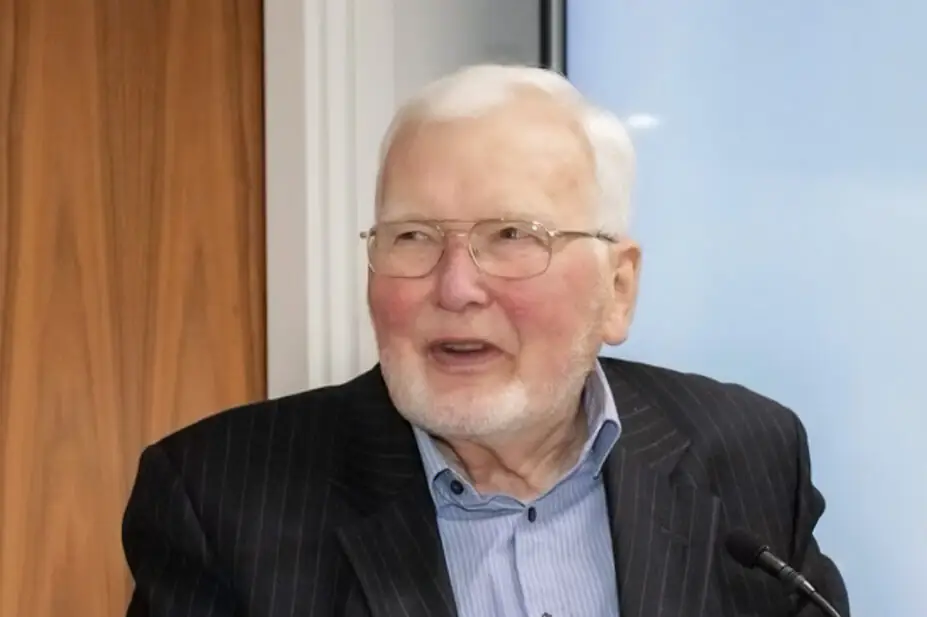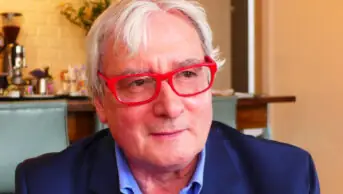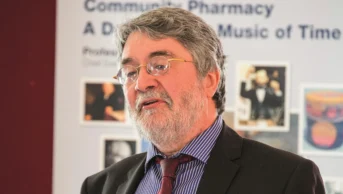
The Twycross Family
Robert Twycross, described as an “outstanding pioneer” in the field of palliative care, has died aged 83 years.
Widely known and respected as co-founder of Palliativedrugs.com — which published Palliative Care Formulary (PCF) and Introducing Palliative Care (IPC), both co-edited by Twycross — his career changed the course of palliative care in the UK and beyond.
Twycross graduated from the University of Oxford Medical School in 1965, before completing his Membership of the Royal Colleges of Physicians of the UK: a postgraduate medical diploma.
Following this, he joined St Christopher’s Hospice as a clinical research Fellow where he began his palliative care career, working alongside St Christopher’s Hospice founder Dame Cicely Saunders.
A tribute published by St Christopher’s Hospice on Facebook on 22 October 2024 said: “Robert led work on the use of morphine in the care for people dying with advancing disease and was instrumental in developing our research work in the early years.”
His life’s work has had a lasting impact on the development and recognition of palliative care as a vital aspect of modern medicine
The International Society of Paediatric Oncology
Twycross went on to become the first palliative care physician to obtain a doctorate in medicine. His work on diamorphine, morphine and methadone has helped standardise and simplify the treatment of cancer pain, which is still used today.
As a palliative medicine consultant, Twycross also served as the academic director of the Oxford International Centre for Palliative Care and head of the World Health Organization Collaborating Centre for Palliative Care from 1988 to 2005 — delivering lectures and teaching in more than 50 countries, with close ties to Argentina, Hungary, India, Poland and Russia.
He was a mentor to many international pioneers and a founding member of several professional organisations, including the Association for Palliative Medicine, the British Lymphology Society, Palliative Care Research Society, European Association for Palliative Care and International Association for the Study of Pain.
The International Society of Paediatric Oncology (IAHPC), of which Twycross was a member, said in a tribute that he was an “outstanding pioneer of the global palliative care movement”.
“His life’s work has had a lasting impact on the development and recognition of palliative care as a vital aspect of modern medicine and his incalculable contributions live on in IAHPC’s vision of a world free from health-related suffering,” it added.
Additionally, his international influence is evidenced by tributes shared by the Instituto Pallium Latinoamérica, the Associação Portuguesa de Cuidados Paliativos and Pallium India.
Twycross is regarded as one of the most skilled and prolific medical writers in palliative care. In addition to more than 300 articles, chapters and editorials, Twycross has co-authored multiple textbooks, including IPC and PCF, first published in 1988, which is now in its eighth edition.
In 2000, Twycross and Andrew Wilcock, a retired consultant and academic in palliative medicine, founded Palliativedrugs.com to share and promote information about palliative care medicines.
During their professional tenure, Wilcock said he was in “awe of Twycross’s drive, determination and capacity for work”.
“I personally know of no other person that has made such a profound and sustained contribution to the development and provision of palliative care around the world,” he said.
“I was very much his mentee, but this evolved into a long and successful writing partnership based on a shared love of learning, mutual respect and desire to improve palliative care through the provision of accessible knowledge.”
In 2018, the digital platform was acquired by Pharmaceutical Press (PhP), part of the Royal Pharmaceutical Society (RPS), where PCF became part of MedicinesComplete and IPC became part of PhP’s product offering.
In a tribute published on 23 October 2024, PhP said it was “deeply saddened” by Twycross’s death, saying that he had “been instrumental in helping to open up the field of pain medicine, palliative care and research, and we will miss his unwavering support and dedication to improving knowledge in this specialist area”.
Karen Baxter, managing director of PhP and deputy chief executive of the RPS, described Twycross as “an energetic force for good in the field of palliative care”.
“I first met Robert almost 20 years ago through publishing, and over recent years, many of the team at PhP have had the pleasure of working closely with him as we learned the philosophy behind his published works,” she said.
“We found common ground in his passion for better patient outcomes, and while he always set a high bar, it was driven by his single-minded focus on easing the pain of others and, therefore, worthwhile striving to achieve.”
“Robert was an energetic force for good in the field of palliative care, and his outstanding career and legacy are a testament to this. He will be a much-missed source of advice to us and the wider palliative care community,” Baxter added.
Sarah Charlesworth, specialist pharmacist editor of PCF, said working with Twycross for the past 20 years “has been a deep honour and privilege”.
“It is hard to put into words the enormous impact Robert has had in the UK and worldwide. His inexhaustible drive and passion for the pharmaceutical aspect of symptom control in palliative care and his scrutiny and knowledge of the literature, along with his assiduous attention to detail and accuracy, was always inspiring and something that I will carry forward with me as we continue the legacy of PCF,” she said.
“He was a unique gentleman of great character and faith, and he will be greatly missed for his guidance and wise words.”
Twycross’s view against the legalisation of physician-assisted suicide has been long-standing and well known. As one of the best-informed contributors to the debate, Twycross submitted detailed written evidence to the House of Commons Health and Social Care Committee on the matter in January 2023.
His final paper was published in BMC Palliative Care in April 2024 — ‘Assisted dying: principles, possibilities, and practicalities — An English physician’s perspective’ — in which he explored the possible “least worse” option in the event of assisted dying being legalised.
Throughout his career, Twycross’s significant contributions have been acknowledged by several awards, medals and honorary life memberships from international and national societies, such as those in Poland, Germany, the United States and India, as well as the International Association for Hospice and Palliative Care.
In 1996, he became the first physician from palliative medicine to be elected Fellow of the Royal College of Radiologists for ‘services to medicines’.
Above all his professional achievements, Twycross was a much-loved husband to Deirdre; father to Alison, Judith, Fiona, John and David; and grandfather to Isabella, Joe, Dexter, Io, Lula, Dora, Winston, Zinnia and Elodie.
As a man of faith and Christian belief, Twycross was loving, compassionate and well known for his hospitality and for opening his home to family, friends and colleagues — regularly welcoming people from around the world.
“Dad was my role model, my mentor and my sternest critic,” said Alison Twycross, his eldest daughter and retired professor of children’s nursing.
“He wrote so many textbooks that it was natural for me to write books too. Dad and I shared a passion for promoting evidence-based care. He was thrilled when I became editor-in-chief of Evidence Based Nursing in 2010.
“I am incredibly proud of the legacy Dad has left behind. He reshaped the way end-of-life care is delivered around the world,” she said.
“Along with several other family members, including myself, Dad was a passionate supporter of Oxford United. I have many happy memories of birdwatching with him, another of our shared passions. Dad was also a keen gardener and walker. I will miss him but am glad he died peacefully at home.”
1 comment
You must be logged in to post a comment.
You may also be interested in

Philip Leon Marshall Davies (1938–2026)

Bill Scott OBE (1949–2025)

I feel honoured to have had a small connection with Robert Twycross. The Palliative Care Formulary revolutionised our work as pharmacists specialising in this area of work where a large proportion of drug use was off-licence. The work started by Drs Twycross and Willcock hugely advanced our ability to make recommendations to non-specialists and reassure specialist colleagues. The advent of the bulletin board gave us an opportunity to share information and collect data. Attending the Oxford Advanced Course in Pain and Symptom Management was the most informative experience every year for a fortunate large number of specialists and I recall vividly being put on the spot to answer a question by Dr Twycross in front of an audience of far more erudite clinicians. All palliative care specialist pharmacists owe a tremendous amount to this inspiring man who really valued our contribution to the multidisciplinary team. He has left the most wonderful legacy as the work continues.